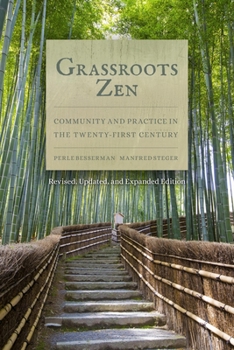Grassroots Zen: Community and Practice in the Twenty-First Century
Select Format
Select Condition 
Book Overview
"Future generations may come to see the publication of Grassroots Zen as a pivotal moment in the emergence of a uniquely American Zen."
--Rami Shapiro, Minyan: Ten Principles for Living a Life of Integrity
"Steger and Besserman offer something quite different, and quite welcome... a Zen that comes to terms with, and ultimately transcends, the hierarchical, sexist, otherworldly, and pseudo-militaristic overtones of the Zen tradition." --Library Journal
"This book will appeal to all] who are uncomfortable with Zen's hierarchies and moral prescriptions." --Shamhbala Sun
"... Steger and Besserman name and describe a phenomenon that is occurring all over the country: relatively small, democratically run groups of Zen Buddhist practitioners are banding together and sustaining a sangha, or community, free of the hierarchy and formality of the monastery."
--Publishers Weekly
"A short, clear presentation on one way to make Zen less Japanese and more Western... " --Rita M. Gross, Buddhism After Patriarchy
Grassroots Zen envisions a socially engaged Buddhism where zazen is integrated each day with work, family, and social obligations. Though both authors have practiced traditional Zen for decades, here they eschew the militaristic, patriarchal tendencies of Zen in favor of "an egalitarian community of socially mobile members who place less emphasis upon transmission and hierarchy than on individual responsibility."
Married university professors and authors Manfred Steger (Gandhi's Dilemma: Nonviolent Principles and Nationalist Power) and Perle Besserman (aka Perle Epstein) (The Shambhala Guide to Kabbalah and Jewish Mysticism) studied first under the cultural weight of Japanese Zen, then with the light-footed lay master Robert Aitken. Founders of the Princeton Area Zen Group in NJ, they have been teaching their democratic, grassroots-style of Zen for over twenty-five years.





